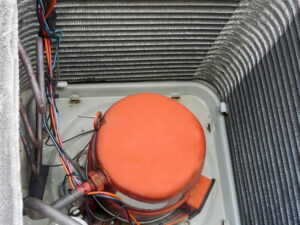
Throughout the lifespan of your air conditioner, there are a variety of issues that can befall it. Most of these issues are a result of good ol’ fashioned wear and tear, and some other issues are caused by a lack of maintenance, manufacturer defect, or some other type of system damage. But considering that you want your air conditioner to work reliably as possible through our warm springs and stifling summers, it makes sense that you want to take care of these needs as effectively as possible.
One potential repair need that’s particularly unpleasant to face is a broken AC compressor. With most cooling system parts, replacement of that part is typically the best choice. But if you have a broken down compressor, the questions turns into whether you should replace just the component, or the entire cooling system. This is because the compressor is actually the most expensive component in your air conditioner. Learn how to recognize the early signs that your AC needs help before it leads to major failures like compressor breakdown. Read on to learn more!
Considering the Expense of Your Compressor
This is the main reason we will usually recommend looking at your air conditioning system as a whole—the compressor is actually the most expensive part in it to replace.
Before you make a decision though, it bears mentioning that whatever your air conditioning repair needs are, you should talk to a qualified professional to get an honest and reliable assessment of what’s actually going on. The last thing you need is a misdiagnosed repair need, after all. When you work with us, there’s no need to worry.
Compressors, which are tasked with compressing the refrigerant within the air conditioner, actually do come with a lot of misdiagnoses. However, we’ll assume for the sake of brevity that you already know that you’re dealing with a compressor problem. Your first step then, should be to check and see if your system is still under warranty. If it is, then you will not have to pay for a compressor replacement or air conditioner repair, as long as you kept up with professional maintenance and haven’t done any repairs on your own to void the warranty.
It bears mentioning as well that the likelihood of a compressor breaking down while the system is still under warranty is relatively uncommon. So, if you do not have warranty coverage, it’s almost certainly a good idea to move forward with a full air conditioner replacement.
Of course, there are a number of factors to consider here. You’ll want to think about your budget, not only now for the installation but in the future for what you will pay for an inefficiently operating AC system versus a new, high-efficiency one.
You’ll also want to think about what it means to just replace the compressor, which means replacing the entire outdoor unit of your air conditioner. The indoor and outdoor units are designed to work together. So, when you replace one for a newer unit while keeping the other in place, you could run into efficiency problems and maybe even a full air conditioner breakdown. Today’s high-efficiency air conditioners offer advanced features that improve performance and energy savings—making a full system upgrade a more worthwhile investment.
“How Do I Even Know If My Compressor Is Bad?”
That’s a great question! There are a few pretty apparent signs to watch out for. For example, you might not be getting enough cool air coming through your vents. Your air conditioner functions correctly when the refrigerant is successfully flowing into the evaporator coils to be compressed by the compressor, and this is when the air is chilled and returned to your home. Use these basic AC troubleshooting steps to narrow down the issue before deciding on a costly replacement.
A lack of cooled air could mean you have a refrigerant leak, and that is absolutely something our team will check for! But another possibility is that your compressor has failed.
Another sign of compressor failure is strange noises coming from the outside unit. This can include hissing, or humming. Pretty much anything you hear outside of the normal operation of your AC makes it worth giving us a call.
For quality air conditioning service in Duluth, GA, contact DC Heating, Cooling & Plumbing today!



